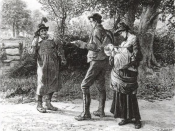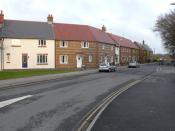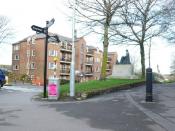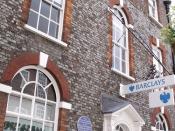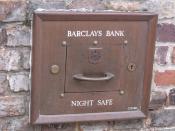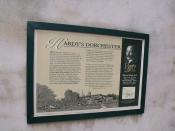Literature: The Mayor of Casterbridge Can it be said that Henchard's downfall is all due to 'some great error?' Some may believe that it is a penance for selling Susan, but this would be to take Newson out of the equation, who, it must be said, is just as guilty of this act as Henchard. I believe that Henchard is totally blameless for his downfall, to use a bad pun that will become apparent later, it is in his nature. It is my belief that Henchard is a personification of nature. It is obvious that his life has completed a revolution but when you look closely, you can see that Henchard's life resembles the seasons.
Our first image of Henchard is one of winter, his clothing is described as "â¦a short jacket of brown corduroyâ¦white horn buttonsâ¦and a straw hat overlaid with black glazed canvas." Black, brown and white conjure images of the countryside in the heart of winter for me.
Hechard's life is in a rather bad point but things start looking up when he sells Susan, it is at this point that he moves into spring. We are told little of what happens between Susan's sale and when she comes looking for him but I would say that during this period Henchard passes through spring as he gives up liquor and moves into summer when he becomes mayor. When we next see Henchard he is on the brink of autumn, his progression down through the social strata is very autumnal as his creeps, inch by inch, towards the inevitable. When he reaches the lowest of the low he does not stay in the town and sponge off Elizabeth-Jane and Farfrae, he follows the yearning of his soul and returns to nature. When he dies he is back in winter but just on the verge of spring, exactly like the start of the book.
Just having a life resembling the seasons would not immediately lead me to think that Henchard is closely linked to nature, his very character seems natural. The best example of his naturalness is when Farfrae introduces the rowing machine. Henchard is opposed to it and wishes to stay with the tried and true, yet somewhat chaotic, seed lip. Henchard is, like nature, chaotic and unpredictable. He is able to disgrace a man while keeping his mother well stocked with firewood. Henchard's success can be attributed to his closeness to nature much more than his business acumen.
If Henchard's nature makes him fail, then it may be asked why Farfrae succeeds. I believe that Farfrae is the antithesis of Henchard; he is very close to science, machines and the modern world. While Henchard runs his business with "you shall ha'et" and "I'll do't," Farfrae runs his with "letters and ledgers" and also his rowing machine. The rowing machine is the best example in the novel of how Farfrae runs his business, it precisely places the seeds in rows, letting none go to waste. Hechard's beloved seed lip is exactly the opposite it scatters the seeds haphazardly allowing nature to take its course. It, like Henchard, is highly chaotic and unpredictable.
Not allowing himself to be ruled by numbers makes Henchard's life unpredictable to the utmost degree. I have read a little on chaos theory and found that when one looks hard enough at something that seems chaotic, patterns will eventually emerge. This theory seems to fit Henchard's life perfectly as when one really starts looking for sense in his life it will eventually become seemingly apparent, this is why on first reading it may seem that one action caused Henchard's downfall. As far as I can see Hechard's life changes because it does. Asking why he has problems in life is like asking why gravity goes down not sideways. There is no clear answer and I believe that Hardy has structured the novel so that we are mislead into thinking that there is a deep reason for his downfall. It is obvious throughout the book that Hardy likes to mislead the reader, one only has to look at the truth of Elizabeth-Jane (2)'s true parentage to see that we are constantly fed misinformation. I think that Hardy has written in the whole subtext of fate to throw the reader from the ultimate truth, that things just happen in nature.
I have been known to read too much into books and in some cases read too little but I believe that Henchard's rise and fall are actually a metaphor for the modernization of the world that was happening at that time. In my theory Henchard represents nature, the old ways and in some ways the pagan god Pan. Farfrae represents the city, science and modern beliefs. When Christianity started to phase out Paganism, the Pagan god of nature Pan became the Christian devil. This is why at some times we are meant to hate or even fear Henchard. At least we feel something about Henchard, Farfrae leaves me feeling indifferent to say the least, he has no passions or anything on which to judge him. Farfrae could be described as soulless, like his figures or his farming equipment. When Henchard dies he fades away, like the outmoded farming methods he uses. He is remembered fondly like the proverbial 'good old days.' It is a sad moment when Henchard dies, even if you do not like him you have to feel sad that a period of history has died with him.
After reading "The Mayor of Casterbridge" I felt filled with a sense of insecurity about the future, it worried me that because things happen, more often than not to strangers, they would never happen to me. However, in reading this book I became attached to Henchard and seeing him die as he did pushed home the fact that while things just happen, they will happen to anyone.
